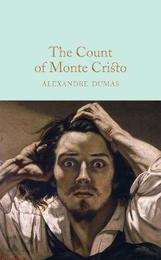
|
The Count of Monte Cristo
Hardback
Main Details
| Title |
The Count of Monte Cristo
|
| Authors and Contributors |
By (author) Alexandre Dumas
|
|
Introduction by Marcus Clapham
|
| Series | Macmillan Collector's Library |
|---|
| Physical Properties |
| Format:Hardback | | Pages:696 | | Dimensions(mm): Height 158,Width 103 |
|
| Category/Genre | Classic fiction (pre c 1945) |
|---|
| ISBN/Barcode |
9781509827978
|
| Classifications | Dewey:843.7 |
|---|
| Audience | |
|---|
|
Publishing Details |
| Publisher |
Pan Macmillan
|
| Imprint |
Macmillan Collector's Library
|
| Publication Date |
18 May 2017 |
| Publication Country |
United Kingdom
|
Description
The Count of Monte Cristo by Alexandre Dumas is the ultimate novel of retribution. Based on a true story, it recounts the story of Edouard Dantes, his betrayal and imprisonment in the sinister Chateau d'If. Years later, Paris is intrigued by the mysterious Count of Monte Cristo, who bursts onto the Paris social scene with his millions. He encounters the three principal betrayers of Dantes who have prospered in the post-Napoleonic boom and, one by one, their lives fall apart. The book was a huge, popular success when it was first serialized in 1844, and remains the greatest tale of revenge. This beautiful, abridged Macmillan Collector's Library edition of The Count of Monte Cristo features an afterword by Marcus Clapham. Designed to appeal to the booklover, the Macmillan Collector's Library is a series of beautiful gift editions of much loved classic titles. Macmillan Collector's Library are books to love and treasure.
Author Biography
Alexandre Dumas was born in 1802. After a childhood of extreme poverty, he took work as a clerk, and met the renowned actor Talma, and began to write short pieces for the theatre. After twenty years of success as a playwright, Dumas turned his hand to novel-writing, and penned such classics as The Count of Monte Cristo (1844), La Reine Margot (1845) and The Black Tulip (1850). After enduring a short period of bankruptcy, Dumas began to travel extensively, still keeping up a prodigious output of journalism, short fiction and novels. He fathered an illegitimate child, also called Alexandre, who would grow up to write La Dame aux Camelias. He died in Dieppe in 1870.
|